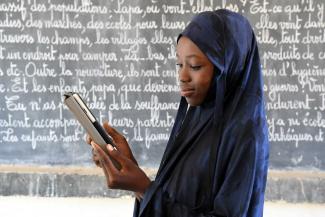Gender equality
Successes and setbacks in women's equality

Women were more impacted by the coronavirus crisis than men and experienced an increase in unemployment and poverty. There were more early and forced marriages as well as more gender-based violence (GBV). In some countries, cases of domestic violence rose by 30 %. Women also face greater risk when it comes to fighting the pandemic, given that they make up about 70 % of health care workers worldwide. These are some of the findings of UNICEF's annual report on gender equality.
Despite the coronavirus crisis, UNICEF has recorded some successes in the health-care sector. The child welfare organisation advocated for the maintenance of important health services for mothers in the pandemic. By the end of 2020, 38 countries had plans to scale up the care of mothers and newborns – seven countries more than in 2019. Seventy-one countries, 14 more than in the previous year, integrated nutrition counselling into prenatal care.
UNICEF saw setbacks with regard to HIV infection rates in adolescent girls and in maternal mortality rates worldwide. In both areas, according to the report, the numbers are still too high for the organisation to reach its own targets.
School education was severely impacted by the coronavirus crisis in 2020 (for more, see also Enakshi Dutta et al. on www.dandc.eu). UNICEF advocated for equal learning opportunities within the framework of COVID-19 restrictions. The child welfare organisation also supported gender-responsive distance education in humanitarian settings like refugee camps. According to UNICEF, 301 million children received distance education, about half of them girls. Nevertheless, the report acknowledges that school closures have given rise to concerns about the learning outcomes of girls in particular.
Furthermore, UNICEF assisted governments in their efforts to increase inclusivity and remove bottlenecks in education policy. In 2020, 53 countries included menstrual health and hygiene (MHH) targets in their strategies for water, sanitation and hygiene in schools. MHH was implemented in almost 10,000 schools, and over 70,500 schools, including those for children with disabilities, received separate sanitation facilities for boys and girls.
UNICEF expressed alarm over the increase in gender-based violence. It reacted by increasing its aid and prevention services. UNICEF and its partner organisations are also now offering more of their services online. Thus according to the report, 4.2 million children (among them 1.25 million girls) who have experienced violence were reached by health, social work and justice services. In 83 countries, 17.7 million people in emergency situations received GBV risk mitigation, prevention or response interventions.
An important aspect of UNICEF's work are its efforts to transform damaging gender roles and norms. During the pandemic, UNICEF has often made use of online platforms to achieve that end. In 2020, the organisation was able to reach approximately 2.6 million parents and caregivers in 87 countries. UNICEF also always prioritises including boys and men in its programming.
In order to promote gender equality in the future, UNICEF is planning to coordinate more closely with other UN organisations and pursue cross-sectoral cooperation. Its goals are:
- Strengthening the role of girls and ending child marriage
- Investing in the health of women and girls with regard to HIV, nutrition and sexual and reproductive health
- Promoting school education for girls
- Ending violence against girls and
- Promoting gender-equitable parenting and care.
UNICEF also wants to be better prepared for future emergency situations comparable to the COVID-19 pandemic and include the promotion of gender equality in those measures.
Link
UNICEF, 2021: Gender Equality – Global Annual Results Report 2020:
https://www.unicef.org/media/102281/file/Global-annual-results-report-2020-gender-equality.pdf
Sabine Balk is member of the editorial team of D+C/E+Z.
euz.editor@dandc.eu









